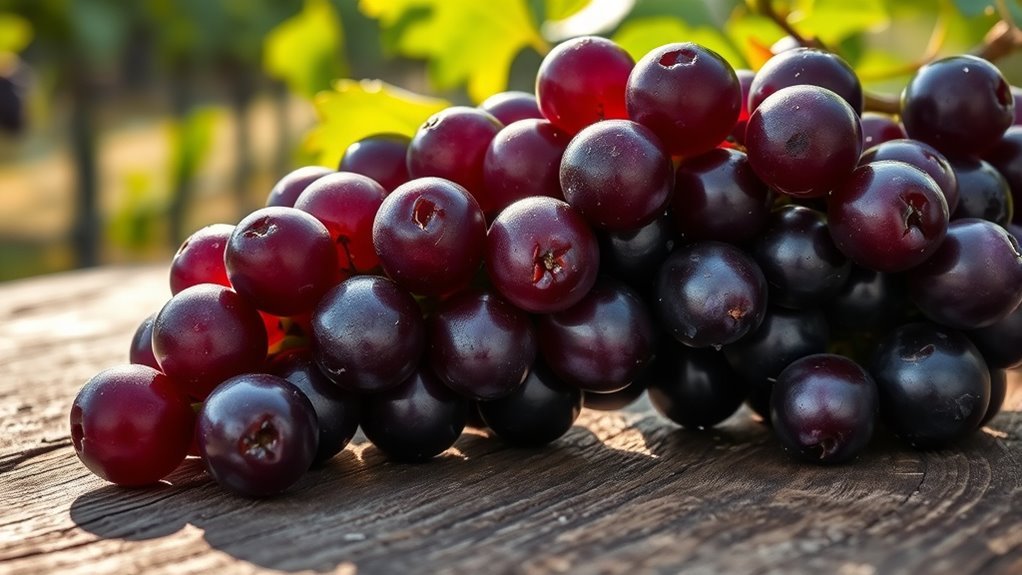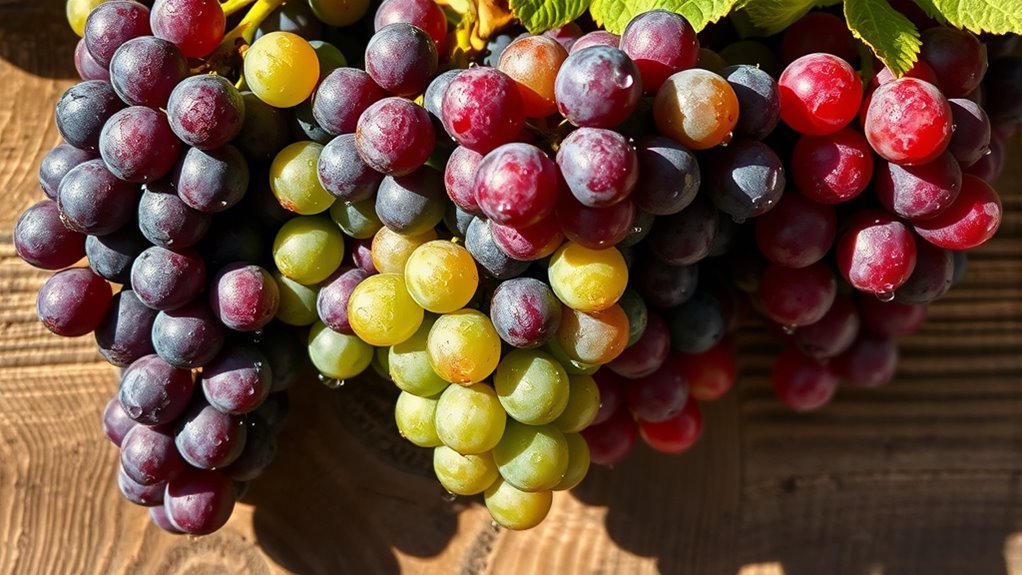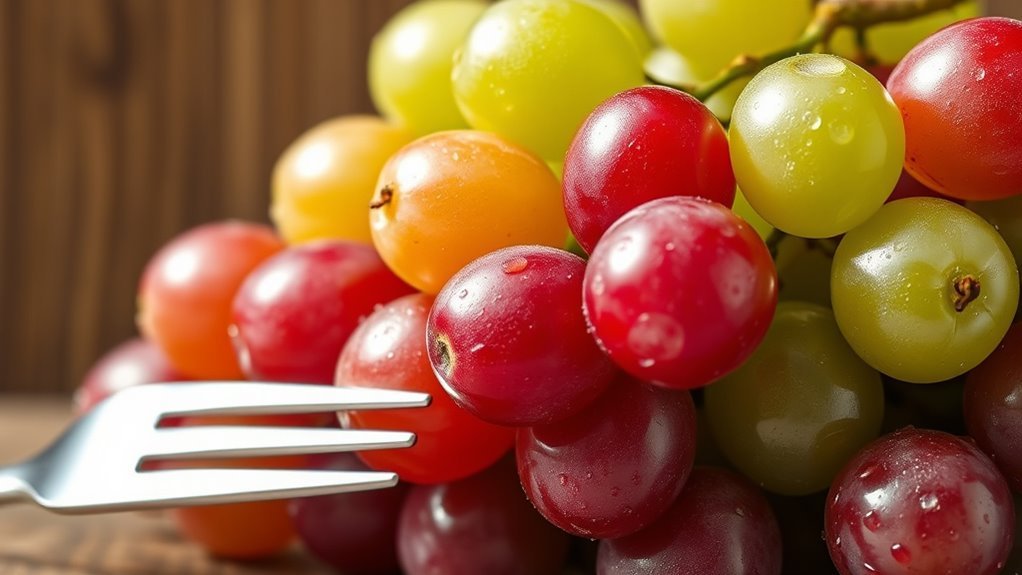Grapes aren’t typically considered keto-friendly due to their high carbohydrate and sugar content. A cup of grapes contains about 27 grams of carbs, which can quickly exceed your daily limit on a keto diet. However, enjoying grapes in moderation can fit into a well-managed keto plan, especially if you pair them with high-fat foods. If you’re curious about how to make grapes work for you, there are a few tips and alternatives to explore further.
Understanding the Keto Diet

When you consider the keto diet, it’s vital to understand its core principles. The ketogenic diet focuses on low carbohydrate intake while emphasizing fats and moderate protein. This shift encourages your body to enter ketosis, where it burns fat for energy instead of glucose. Many people seek keto benefits like weight loss, improved mental clarity, and increased energy levels. However, diet misconceptions abound; some believe it’s solely about eating bacon and cheese. In reality, a balanced approach is essential, incorporating healthy fats, vegetables, and proteins. Understanding these fundamentals empowers you to make informed choices, ensuring you reap the benefits without falling prey to common myths. Embracing this knowledge can lead to a more liberated and fulfilling dietary experience.
Nutritional Profile of Grapes

When considering grapes, it’s important to look at their carbohydrate content, especially on a keto diet where carb intake is vital. Grapes also provide essential vitamins and minerals, making them a nutritious option, but their sugar content can be a concern. Understanding these aspects can help you decide how they fit into your dietary plan.
Carbohydrate Content Overview
Grapes, often celebrated for their sweet juiciness, carry a significant carbohydrate load that can impact those following a keto diet. A cup of grapes contains about 27 grams of carbs, which is quite high for keto standards. While you might enjoy the taste, it’s important to take into account that most grape varieties contain sugars that can quickly add up, potentially knocking you out of ketosis. If you’re looking for keto-friendly alternatives, options like berries or avocados offer much lower carbohydrate counts and can satisfy your cravings without derailing your diet. Ultimately, if you’re committed to keto, it’s essential to be mindful of your grape intake and explore those alternatives that align better with your dietary goals.
Vitamins and Minerals Present
The vibrant hue of grapes hints at their rich nutritional profile, which includes essential vitamins and minerals. You’ll find that grapes are packed with vitamin C, K, and several B vitamins, contributing to their impressive nutrient density. These vitamins play significant roles in immune function, blood clotting, and energy metabolism. Additionally, grapes contain potassium and manganese, which are important for heart health and bone strength. The grape benefits extend beyond just vitamins; their antioxidants, like resveratrol, support overall wellness. While grapes are higher in carbs compared to some keto-friendly options, their nutritional value can complement a balanced diet. Enjoying them in moderation allows you to reap the rewards of their nutrient-rich profile without compromising your dietary goals.
Carbohydrate Content in Grapes

When considering grapes on a keto diet, it’s important to look at their carbohydrate content. A typical serving can contain a significant amount of carbs, which may affect your daily intake. Understanding how portion size impacts your carb count is essential for staying within your keto goals.
Carb Count Overview
With about 15 grams of carbohydrates in a cup of grapes, it’s important to evaluate their impact on a keto diet where carb intake is typically limited to around 20-50 grams per day. While grapes are delicious and come in various grape varieties, they might not be the best choice for keto snacks if you’re trying to stay within those strict limits. If you decide to include grapes, consider portion sizes carefully, as even small amounts can add up quickly. Additionally, alternatives like berries might offer lower carb options while still satisfying your sweet tooth. Balancing your cravings with your dietary goals is essential for maintaining freedom in your food choices while on a keto journey.
Portion Size Impact
Understanding portion size is essential for managing carbohydrate intake on a keto diet, especially with foods like grapes. While they’re delicious, grapes can quickly add up in carbs if you’re not careful. A typical serving size is about 1 cup, which contains roughly 27 grams of carbs. This can be a significant portion of your daily carb allowance on keto. To enjoy grapes while maintaining portion control, consider measuring out smaller servings, like a handful or a small bowl. This way, you can savor their sweetness without derailing your diet. Remember, it’s all about balance—being mindful of serving sizes allows you the freedom to indulge occasionally without compromising your keto goals.
Comparing Grapes to Other Fruits
Though grapes are often enjoyed for their sweet flavor and convenience, they differ considerably from other fruits when it comes to their carbohydrate content, making them less suitable for a keto diet. For instance, many grape varieties contain around 15-20 grams of carbs per cup, while berries, like strawberries and raspberries, typically offer lower carb counts, making them more favorable for keto enthusiasts. In fruit comparisons, you’ll find that melons and avocados also present better options, providing healthy fats and fewer sugars. If you’re looking for alternatives to satisfy your cravings while staying within keto limits, exploring these other fruits can give you the freedom to enjoy a variety of flavors without compromising your dietary goals.
The Impact of Sugar on a Keto Diet
Since sugar is a primary source of carbohydrates, its impact on a keto diet can be significant. When you consume sugar, your body’s sugar metabolism kicks in, converting it into glucose. This process triggers an insulin response, which helps regulate blood sugar levels. For those on a keto diet, high sugar intake can disrupt ketosis, the metabolic state where your body burns fat for fuel instead of carbs. Staying in ketosis is vital for achieving your dietary goals, so it’s important to monitor your sugar intake. While natural sugars found in fruits may seem tempting, they can quickly add up and affect your overall carbohydrate limits. Balancing freedom in your food choices with your keto objectives is key.
Portion Control: How Many Grapes Can You Eat?
When managing your carbohydrate intake on a keto diet, portion control becomes essential, especially with foods like grapes that are naturally higher in sugar. To enjoy grapes while staying mindful of your carb limits, consider these tips:
- Choose Grape Varieties Wisely: Some varieties, like red and black grapes, contain more sugar than others.
- Limit Your Serving Size: Stick to a small handful—about 15-20 grapes—to keep carbs in check.
- Pair with Protein or Fat: Combining grapes with cheese or nuts can help balance your meal.
- Practice Mindful Eating: Savor each grape, focusing on its flavor, to enhance your satisfaction without overindulging.
With careful portion control, you can enjoy grapes while remaining true to your keto goals.
Grapes and Ketosis: What You Need to Know
Understanding how grapes fit into your keto diet is essential for maintaining ketosis, especially given their higher carbohydrate content. While certain grape varieties can be higher in sugar, you can still enjoy them in moderation if you’re mindful of your overall carb intake. For instance, a small handful of grapes might be an occasional treat, but it’s important to balance this with lower-carb keto snacks throughout the day. Remember that the key to staying in ketosis is to keep your daily carb limit in check. If you’re craving something sweet, consider exploring other options, but if you choose to indulge in grapes, make sure to account for their carbs to maintain your freedom in your dietary choices.
Alternatives to Grapes on a Keto Diet
If you’re looking for alternatives to grapes on a keto diet, there are plenty of delicious, low-carb options that can satisfy your sweet cravings without derailing your progress. Here are some keto friendly fruits and low carb snacks you might enjoy:
- Berries (strawberries, raspberries, or blackberries) – These are lower in carbs and packed with antioxidants.
- Avocado – While not sweet, it’s creamy and nutritious, making for a satisfying snack.
- Coconut – Enjoy unsweetened coconut flakes for a tropical twist and healthy fats.
- Olives – These are a savory option that’s rich in healthy fats and low in carbs.
These alternatives can help you stay on track while still enjoying a variety of flavors on your keto journey!
Tips for Incorporating Grapes Mindfully
When adding grapes to your keto diet, it’s crucial to practice mindfulness to maintain your carb limits. You can do this by controlling your portions, pairing grapes with low-carb foods, and timing your consumption wisely. By following these strategies, you’ll enjoy the benefits of grapes without compromising your dietary goals.
Portion Control Strategies
Although grapes can be a tempting addition to your diet, practicing portion control is essential for staying within your carb limits on a keto diet. Here are some strategies for mindful eating:
- Measure Your Portions: Use a scale or measuring cup to determine appropriate portion sizes.
- Serve in Small Bowls: Instead of eating straight from the bag, serve grapes in a small bowl to limit how many you consume.
- Pair With High-Fat Foods: Balance grapes with high-fat snacks to satisfy cravings while maintaining carb control.
- Mindful Eating Practices: Focus on the taste and texture of each grape, allowing yourself to savor the experience, which can help reduce overeating.
Pairing With Low-Carb Foods
Incorporating grapes into your keto diet can be enjoyable when paired with low-carb foods that complement their sweetness while keeping your overall carb intake in check. Consider grape pairings like cheese or nut butter, which provide healthy fats and protein, making a satisfying low-carb snack. You might also enjoy grapes with a handful of almonds or walnuts for a crunchy contrast. Alternatively, mixing them into a spinach salad with feta and olive oil can enhance both flavor and nutrition. By mindfully selecting low-carb companions, you can indulge in the natural sweetness of grapes without derailing your diet. Remember, moderation is key—these pairings allow you to enjoy grapes while staying aligned with your keto goals.
Timing Your Consumption
To successfully enjoy grapes on a keto diet, it’s important to reflect on the timing of your consumption. Implementing effective timing strategies can help you balance enjoyment and your dietary goals. Here are some tips to contemplate:
- Morning Snack: Start your day with a small portion of grapes to curb cravings.
- Pre-Workout Fuel: Consume grapes before exercising for a quick energy boost without heavy carbs.
- Mindful Pairing: Enjoy grapes with low-carb protein sources to balance your intake.
- Limit Consumption Frequency: Instead of daily, think about enjoying grapes a few times a week to stay within your carb limits.
Final Thoughts on Grapes and Keto
While grapes can be a delicious snack, their high sugar content makes them a tricky choice for those on a keto diet. If you’re aiming for keto fruitfulness, it’s essential to enjoy grapes in moderation. A small handful can satisfy your craving without derailing your carb count. Remember, the key to a successful keto lifestyle is balance; you don’t have to eliminate all your favorite foods. Instead, consider substituting grapes with lower-carb fruits like berries when possible. If you do indulge, keep track of your overall carb intake for the day. Ultimately, it’s about finding what works for you, allowing you the freedom to enjoy your diet while staying on track with your health goals.
Frequently Asked Questions about Grapes on the Keto Diet
1. Are grapes keto-friendly?
Grapes are generally not considered keto-friendly due to their higher carbohydrate content. A single cup of grapes contains around 27 grams of carbs, which can exceed the daily carb limit for those following a strict ketogenic diet. Therefore, while you can enjoy them in moderation, they may not fit well into a typical keto meal plan.
2. What fruits can I eat on a keto diet instead of grapes?
Instead of grapes, consider lower-carb fruits such as berries (strawberries, raspberries, and blackberries), avocados, and melons like cantaloupe and watermelon. These fruits typically have a lower glycemic index and carbohydrate count, making them more suitable for a ketogenic lifestyle.
3. Can I eat a small amount of grapes on keto?
Yes, you can enjoy a small amount of grapes on a keto diet, but it’s important to monitor your overall carbohydrate intake. Eating a small portion, such as a handful, may fit into your daily carb limit if you’re careful with other food choices throughout the day. However, it’s best to keep track of how these carbs affect your ketosis.
4. What happens if I eat too many grapes on a keto diet?
Eating too many grapes on a keto diet can lead to exceeding your carbohydrate limit, which may kick you out of ketosis. This can result in increased cravings for sugary foods, fatigue, and disrupted weight loss. If you find yourself consuming too many carbs from grapes, consider reevaluating your portion sizes and meal planning.
5. Are there any health benefits to eating grapes on a keto diet?
While grapes are not typically recommended for a keto diet, they do contain beneficial nutrients such as vitamins C and K, antioxidants, and fiber. If you choose to include them in small amounts, you can still enjoy these benefits. However, it’s important to balance their consumption with other low-carb foods to maintain ketosis.
References
- https://www.healthline.com/nutrition/keto-diet-foods#fruits
- https://www.ncbi.nlm.nih.gov/pmc/articles/PMC6770486/
- https://www.medicalnewstoday.com/articles/323371
- https://www.dietaryguidelines.gov/
- https://www.webmd.com/diet/what-is-the-keto-diet
- https://www.verywellfit.com/keto-diet-and-fruits-5111853
- https://www.heart.org/en/healthy-living/healthy-eating/eat-smart/nutrition-basics/what-is-the-ketogenic-diet
- https://www.cdc.gov/nutrition/resources-publications/healthyeating.html


